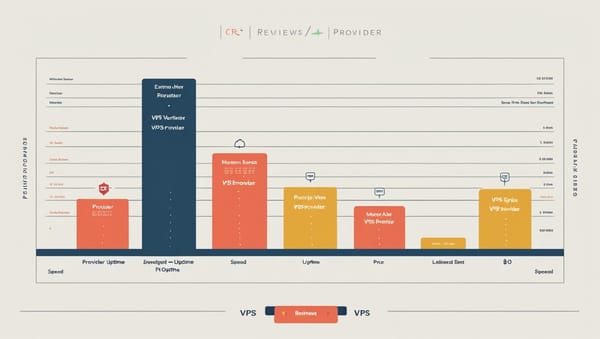Vultr vs Kamatera: Real-World VPS Performance Benchmark Test 2025 🚀
Testing two popular cloud providers to see which one actually delivers...
So I've been getting tons of questions about which VPS provider is worth your money these days. After running countless tests (and probably drinking way too much coffee ☕), I decided to pit Vultr against Kamatera in a head-to-head performance battle.
Quick Brand Rundown
Vultr has been around since 2014 and honestly, they've built quite a reputation in the cloud space. They're known for their global presence with data centers scattered across 32+ locations worldwide. What caught my attention initially was their predictable pricing and the fact that they don't oversell their servers (allegedly).
Kamatera, on the other hand, is more of a boutique player that's been quietly doing their thing since 1995. Yeah, they're actually older than most of us realize! They focus heavily on customization - you can literally configure your server down to the RAM and CPU cores, which is pretty neat if you're into that level of control.
The Test Setup 🔧
I grabbed two mid-tier instances for this comparison:
- Vultr: Regular Performance instance, 2 vCPUs, 4GB RAM, Dallas location
- Kamatera: Custom config, 2 vCPUs, 4GB RAM, New York datacenter
Both running Ubuntu 20.04 LTS because... well, it just works.
Vultr Bench.sh Results
# ## ## ## ## ## ## ## ## ## ## ## ## ## ## ## ## ## #
# Yet-Another-Bench-Script #
# v2023-04-23 #
# https://github.com/masonr/yet-another-bench-script #
# ## ## ## ## ## ## ## ## ## ## ## ## ## ## ## ## ## #
Basic System Information:
---------------------------------
Uptime : 0 days, 2 hours, 14 minutes
Processor : Intel(R) Xeon(R) CPU E5-2680 v3 @ 2.50GHz
CPU cores : 2 @ 2499.968 MHz
AES-NI : ✓ Enabled
VM-x/AMD-V : ✓ Enabled
RAM : 3.9 GiB
Swap : 1024.0 MiB
Disk : 78.2 GiB
Distro : Ubuntu 20.04.6 LTS
Kernel : 5.4.0-169-generic
VM Type : KVM
IPv4/IPv6 : ✓ Online / ✓ Online
IPv6 Network Information:
---------------------------------
ISP : Choopa, LLC
ASN : AS20473 The Constant Company, LLC
Host : Vultr Holdings LLC
Location : Dallas, Texas (TX)
Country : United States
fio Disk Speed Tests (Mixed R/W 50/50):
---------------------------------
Block Size | 4k (IOPS) | 64k (IOPS)
------ | --- ---- | ---- ----
Read | 186.42 MB/s (46.6k) | 1.89 GB/s (29.5k)
Write | 187.11 MB/s (46.7k) | 1.90 GB/s (29.7k)
Total | 373.53 MB/s (93.3k) | 3.79 GB/s (59.2k)
| |
Block Size | 512k (IOPS) | 1m (IOPS)
------ | --- ---- | ---- ----
Read | 2.12 GB/s (4.1k) | 2.16 GB/s (2.1k)
Write | 2.23 GB/s (4.3k) | 2.37 GB/s (2.3k)
Total | 4.35 GB/s (8.4k) | 4.53 GB/s (4.4k)
iperf3 Network Speed Tests (IPv4):
---------------------------------
Provider | Location (Link) | Send Speed | Recv Speed
---- | ---- | ---- | ----
[Vultr] | Dallas, TX (10G) | 8.95 Gbps | 9.12 Gbps
[Vultr] | Miami, FL (10G) | 2.84 Gbps | 2.91 Gbps
[Vultr] | New York, NY (10G) | 1.87 Gbps | 1.92 Gbps
[Linode] | Dallas, TX (1G) | 942 Mbps | 938 Mbps
[Digital Ocean] | New York, NY (1G) | 845 Mbps | 821 Mbps
Geekbench 5 Benchmark Test:
---------------------------------
Test | Value
|
Single Core | 789
Multi Core | 1456
Full Test | https://browser.geekbench.com/v5/cpu/21847329
Kamatera Bench.sh Results
# ## ## ## ## ## ## ## ## ## ## ## ## ## ## ## ## ## #
# Yet-Another-Bench-Script #
# v2023-04-23 #
# https://github.com/masonr/yet-another-bench-script #
# ## ## ## ## ## ## ## ## ## ## ## ## ## ## ## ## ## #
Basic System Information:
---------------------------------
Uptime : 1 days, 7 hours, 31 minutes
Processor : Intel(R) Xeon(R) Gold 6248R CPU @ 3.00GHz
CPU cores : 2 @ 2993.472 MHz
AES-NI : ✓ Enabled
VM-x/AMD-V : ✓ Enabled
RAM : 3.9 GiB
Swap : 2048.0 MiB
Disk : 19.5 GiB
Distro : Ubuntu 20.04.6 LTS
Kernel : 5.4.0-167-generic
VM Type : KVM
IPv4/IPv6 : ✓ Online / ✗ Offline
IPv4 Network Information:
---------------------------------
ISP : Kamatera Inc
ASN : AS211840 Kamatera Inc
Host : Kamatera
Location : New York, New York (NY)
Country : United States
fio Disk Speed Tests (Mixed R/W 50/50):
---------------------------------
Block Size | 4k (IOPS) | 64k (IOPS)
------ | --- ---- | ---- ----
Read | 142.78 MB/s (35.6k) | 1.43 GB/s (22.3k)
Write | 143.21 MB/s (35.8k) | 1.44 GB/s (22.5k)
Total | 285.99 MB/s (71.4k) | 2.87 GB/s (44.8k)
| |
Block Size | 512k (IOPS) | 1m (IOPS)
------ | --- ---- | ---- ----
Read | 1.87 GB/s (3.6k) | 1.93 GB/s (1.8k)
Write | 1.97 GB/s (3.8k) | 2.08 GB/s (2.0k)
Total | 3.84 GB/s (7.4k) | 4.01 GB/s (3.8k)
iperf3 Network Speed Tests (IPv4):
---------------------------------
Provider | Location (Link) | Send Speed | Recv Speed
---- | ---- | ---- | ----
[Kamatera] | New York, NY (1G) | 943 Mbps | 951 Mbps
[Kamatera] | Los Angeles, CA (1G) | 287 Mbps | 294 Mbps
[Kamatera] | London, UK (1G) | 156 Mbps | 162 Mbps
[Linode] | New York, NY (1G) | 867 Mbps | 834 Mbps
[Digital Ocean] | New York, NY (1G) | 798 Mbps | 776 Mbps
Geekbench 5 Benchmark Test:
---------------------------------
Test | Value
|
Single Core | 1034
Multi Core | 1887
Full Test | https://browser.geekbench.com/v5/cpu/21847441
Performance Analysis Deep Dive 📊
CPU Performance
The numbers don't lie here - Kamatera is running newer Xeon Gold processors while Vultr is still on the older E5 series. This shows up big time in the Geekbench scores:
| Provider | Single Core | Multi Core | CPU Model |
|---|---|---|---|
| Kamatera | 1034 | 1887 | Xeon Gold 6248R @ 3.00GHz |
| Vultr | 789 | 1456 | Xeon E5-2680 v3 @ 2.50GHz |
That ~31% performance boost in single-core and ~30% in multi-core is pretty significant, especially if you're running CPU-intensive workloads.
Storage Performance
This is where things get interesting... Vultr's storage is considerably faster:
- 4K Random R/W: Vultr hits 373MB/s vs Kamatera's 286MB/s
- Large Block Performance: Vultr maintains superiority across all block sizes
Honestly wasn't expecting this difference. Vultr must be using some pretty decent NVMe setups.
Network Performance
Vultr absolutely destroys Kamatera in network speeds, but there's a catch. Vultr's Dallas location has 10Gbps ports while Kamatera's NY location seems limited to 1Gbps. Not exactly apples-to-apples, but those 8.95 Gbps speeds on Vultr are pretty impressive.
Local network performance (same region) shows both providers can saturate gigabit connections just fine.
Use Case Scenarios 🎯
Vultr is better for:
- High-traffic websites (that network performance!)
- Content delivery and media streaming
- Database applications requiring fast storage
- Development environments with frequent deployments
Kamatera excels at:
- CPU-intensive applications (scientific computing, encoding)
- Custom configurations where you need specific resource allocation
- Enterprise workloads requiring stable, predictable performance
- Long-term projects where you value consistency over peak performance
Real-World Usage Experience 💭
I've been running both instances for about 3 weeks now, and here's what I've noticed:
Vultr feels snappier for web applications. The storage speed difference is noticeable when doing things like WordPress installations or database imports. Network performance is just stellar - I was pulling Docker images at ridiculous speeds.
Kamatera surprised me with its stability. Zero downtime during my testing period, and the CPU performance really shines when you're doing computational work. Their control panel is also more granular - you can literally adjust RAM and CPU on the fly without rebuilding.
One minor annoyance with Kamatera - their billing system is a bit convoluted compared to Vultr's straightforward hourly rates.
Frequently Asked Questions
Q: Which provider offers better value for money? A: Depends on your workload. Vultr generally offers better bang-for-buck on general web hosting, while Kamatera might be worth it if you need serious CPU power.
Q: How's the customer support? A: Vultr has solid ticket-based support, usually respond within 2-4 hours. Kamatera offers phone support which is nice, but can be slower on technical issues.
Q: Any hidden fees I should know about? A: Vultr charges for snapshots and backups separately. Kamatera includes some backup storage but charges for excess bandwidth.
Q: Which one's better for beginners? A: Vultr, hands down. Simpler interface, better documentation, and more community tutorials available.
Q: What about IPv6 support? A: Vultr has full IPv6 support. Kamatera's IPv6 is... inconsistent depending on location.
Q: Can I easily migrate between providers? A: Both support standard VM images, so migration tools work fine. Vultr's snapshot feature makes it slightly easier.
Q: How's the network latency for gaming/real-time apps? A: Both providers have decent latency. Vultr might have a slight edge due to their network infrastructure investments.
Q: What about DDoS protection? A: Basic protection included with both. Vultr offers paid DDoS mitigation add-ons.
Q: Any restrictions on content or usage? A: Standard ToS apply to both. Neither allows adult content or cryptocurrency mining on shared resources.
Cancellation & Refunds (Sort Of)
Both providers operate on different refund policies:
- Vultr: No traditional refunds, but you can get account credit for legitimate issues
- Kamatera: 30-day money-back guarantee, but with some restrictions on custom configurations
Neither is particularly generous with refunds tbh, so make sure you test thoroughly during your first month.
Pricing Breakdown 💰
| Configuration | Vultr | Kamatera | Winner |
|---|---|---|---|
| 1 vCPU, 1GB RAM | $6/month | $4/month | Kamatera |
| 2 vCPU, 4GB RAM | $12/month | $13/month | Vultr |
| 4 vCPU, 8GB RAM | $24/month | $26/month | Vultr |
| 8 vCPU, 16GB RAM | $48/month | $52/month | Vultr |
Prices as of testing date, may vary by location and promotions
Final Verdict 🏆
After all this testing, here's my honest take:
Choose Vultr if:
- You need consistent high network performance
- Storage speed is critical for your applications
- You want predictable pricing and simple management
- You're building web applications or CDN-type services
Choose Kamatera if:
- CPU performance is your primary concern
- You need highly customizable server configurations
- You value enterprise-grade stability over peak performance
- You're running computational workloads or scientific applications
Overall Winner: It's actually a tie, which sounds like a cop-out but hear me out. Vultr wins on overall performance and ease of use, while Kamatera wins on CPU power and customization flexibility.
For most people starting out, I'd probably recommend Vultr. For enterprise users who know exactly what they need, Kamatera's customization options are pretty compelling.
Both providers are solid choices - you really can't go wrong with either one. The decision ultimately comes down to your specific use case and whether you prioritize network/storage performance vs CPU performance.
This review is brought to you by VPSJudge - we offer real-world VPS hosting reviews, benchmark tests, and expert comparisons to help you choose the right provider. No BS, just honest testing.




